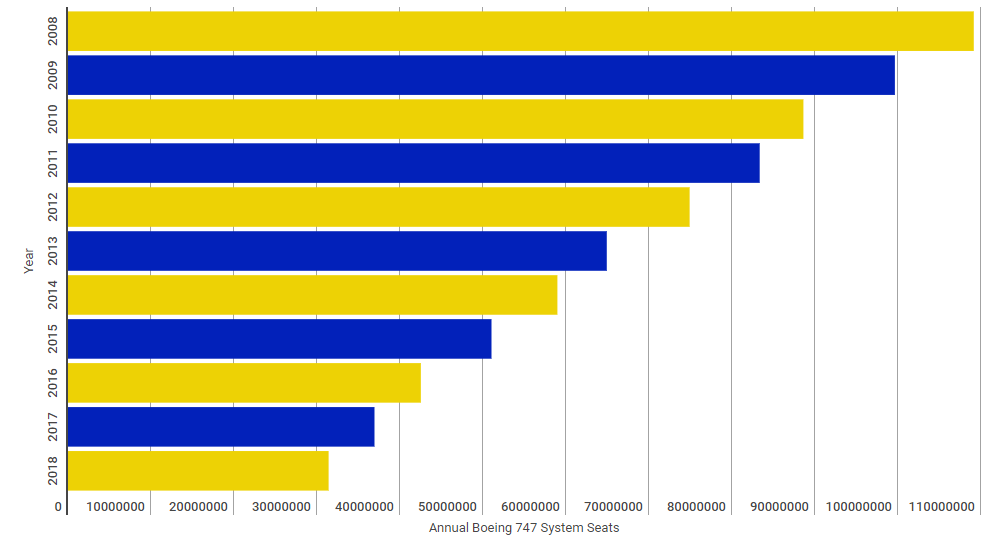Summary:
- The Boeing 777 has now overtaken the Boeing 747 as the most successful widebody aircraft programme by number of deliveries;
- The delivery of a Boeing 777-300ER to United Airlines on 28-Mar-2018 took the 777 programme ahead of the 747;
- The Airbus A330 will also likely overtake the 747 over the next two to three years as the A330neo extends the life of the programme;
- Dubbed the 'Queen of the Skies' the Boeing 747 first entered service almost 50 years ago: there remains more than 500 aircraft in service, the majority as freighters.
The 747 made aviation history when it entered service with US carrier Pan American World Airways in 1970 as the first ever twin aisle aircraft and the first commercial jet with two decks. The 747 was also the biggest commercial jet by seat capacity for 37 years from its entry into service until the Airbus A380 surpassed it in 2007. It is testament to the 747's eminence that it is still in production 52 years after the first order in 1966, even if today's 747-8 variant shares little apart from outward appearance with its original 747-100 incarnation. It has outlasted many rival widebodies and production looks set to continue at least until 2022.
An insight report from market intelligence, research and data solutions specialist CAPA - Centre for Aviation citing data from its Fleet Database shows that more than 500 747s remain in service, the majority in the freight sector. A total of 79 airlines are listed as current operators of the type, although 19 of these have only a single aircraft and 34 have just two.
There are 17 airlines with ten or more 747s in service, collectively accounting for 333 of the 505 aircraft (a 66% share). Atlas Air (39 aircraft) and British Airways (36)are the largest operators of the type, while Lufthansa (31), Korean Air (27), Cargolux Airlines International (23), Cathay Pacific (22), China Airlines (22) and Kalitta Air (20) all operate fleets of 20 or more aircraft.
Our The Blue Swan Daily analysis shows the significant decline in 747 operations over the past ten years. Since 2007 global 747 scheduled passenger capacity has fallen from 115 million seats to just under 37 million last year and is forecast to decline to just over 31 million in 2018, based on published schedules.
CHART - Annual 747 scheduled network capacity is on a downward trend as airlines continue to introduce more efficient twin-engined aircraft on many of its traditional routes Source: The Blue Swan Daily and OAG
Source: The Blue Swan Daily and OAG
The decline in 747 activity at the world's airlines has seen year-on-year capacity declines every year during this period: the largest taking place in 2016 when year-on-year capacity fell -16.7%. Last year 747 capacity declined -13.1% and it forecast to fall by -15.0% in 2018, based on published schedules.
Looking more closely at the current summer schedule we see 747 passenger capacity declining -14.9% and 747 freight tonnage slipping -33.2% versus summer 2017. Frankfurt, London Heathrow, Seoul Incheon, New York JFK and Bangkok are the largest markets for passenger versions of the aircraft and New York JFK, Seoul Incheon, Los Angeles, Chicago O'Hare and Hong Kong the largest for freight operations.
As more efficient twin-engined aircraft such as the A350, 787 and the new 777X enter commercial service, more airlines will drop the popular 747 from operation. In fact many of the most famous operators of the type such as Air Canada, Air France, All Nippon Airways, Cathay Pacific, Japan Airlines, Singapore Airlines and United Airlines have already retired the jumbo jet. Even the A380 (dubbed the 'Super Jumbo') is "struggling to make a big splash" and "the era of four-engined double-decker aircraft appears to be fading," says CAPA.
Boeing's 747 production is now focused mainly on the freighter version, and outstanding orders add up to only a fraction of the backlog for Boeing's 777 and 787 and Airbus' A350 and A330neo programmes. Jumbo the Elephant popularised the term 'jumbo' in the nineteenth century as a description of anything large. Today it is almost synonymous with the 747, underlining the iconic status of the commercial jet programme.
As CAPA notes in its analysis: "Jumbo the Elephant was sold by London Zoo to Barnum & Bailey Circus in 1882, before meeting an untimely death in Ontario in 1885 after being struck by a freight train. The later stages of the 747's life are also closely linked to freight transport, but the jumbo jet seems assured of a more dignified elephant's graveyard when its time eventually comes".
Its glory days may be over, but what is for sure, the Boeing 747's place in aviation history is assured!
READ MORE insights into current Boeing 747 operations: Boeing's 747 aircraft fleet: the original jumbo, overtaken by the 777. CAPA members have access to unrivalled industry analysis, a customised selection of up to 400+ News Briefs daily and access to comprehensive industry data, reports and company profiles. FIND OUT how a CAPA Membership can deliver all the information and connections you need to inspire and keep you ahead of the game.